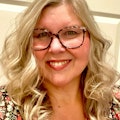On Wed. Feb. 6, the Society of Women Engineers (SWE) hosted a roundtable session about lessons in leadership and empowering women in STEM. The event, which took place at MD&M West in Anaheim, Calif., brought together four distinguished women from various engineering fields to share their experiences, insight and advice on fostering a more inclusive environment for women in STEM.
Meet the Panelists
Ondine Beaufils. Currently serving as a senior engineering manager at Safran Electronics and Defense, Beaufils shared her lifelong passion for aviation. She leads projects that design pilot controls for commercial airplanes and has extensive experience collaborating with major aircraft manufacturers globally.
Mariel Cisneros. A senior program manager at Northrop Grumman, Cisneros described her journey into aerospace engineering, emphasizing her immigrant background and a childhood book about space that inspired her. She leads a team focused on research and advanced design, helping to pave the way for innovative, software-defined aircraft.
Kshitija Garde. A senior engineering program manager at Medtronic, Garde is committed to mentoring young girls in STEM through outreach initiatives. She discussed her role in developing life-saving medical devices and highlighted the need for early exposure to engineering for children.
Dr. Tracy Nguyen. An optometrist and the executive vice president of SWE San Diego, Nguyen’s involvement in engineering is heavily influenced by her daughter’s interest in robotics. She advocates for increasing representation and visibility of female role models in STEM.
The session was moderated by Sophia Leung, food science lab manager at Enzyme Innovation and president of SWE Orange County.
The panelists emphasized the importance of encouraging girls to pursue engineering before they hit middle school, where interest typically declines. They noted that studies indicate girls exposed to female role models are 2.5 times more likely to pursue STEM fields and recommended early outreach programs and initiatives to change the narrative around who can be successful in engineering, stating that representation can significantly impact a girl’s confidence in her abilities.
Cisneros said the decline might start even earlier. Recounting how she goes to local elementary schools to talk with girls as early as kindergarten age about STEM, she noticed that when she asks them to draw an engineer, 90% of the time it’s a man with glasses and a coat. “It’s your…typical scientist kind of thing,” she said, noting that “it’s because of the cartoons that they’re watching, right …So even as [young] as five years old, they always draw the man.”
To help introduce women in STEM at that young age, Cisneros said she brings guests from her women in engineering network to talk about the amazing things they are doing. “We build rockets and we build heart valves and we build airplanes, and we do these amazing things, and we’re women. But as early as, you know, the kindergarteners, they're drawing all men. So I think that that's interesting.”
Networking, Mentorship, Career Progression and Retention
Networking was a central theme, with the panelists urging young women to seek mentorship from their networks. They highlighted the value of organizations like SWE as vital support systems. In addition, they discussed structured mentorship programs at their respective companies, including Northrop Grumman, which pairs early-career engineers with senior leaders.
“We’re a group of Gen Z engineers looking to transition from academia into industry,” one audience member offered. “We were wondering what advice you have for us.” Garde said to remember it takes practice and time to master the art, adding that it takes teamwork and diligence. Beaufils urged them to do an internship, even if they have already graduated, stating, “I personally will only hire someone who’s done an internship because I want to make sure that they know how the corporate world works.”
When discussing retention of women in STEM careers, the panelists shared strategies for personal and professional development. Garde emphasized the importance of having a strong peer network, while Cisneros advised on the critical skill of effective communication, particularly in showcasing one’s accomplishments to management. Nguyen said the SWE chapters across the country are always willing to help.
As the session concluded, the panelists shared actionable advice for women entering the engineering field:
- Establish connections and engage actively in organizations like SWE.
- Seek out mentors within close proximity to your work for deeper insights.
- Be flexible in career beginnings and embrace opportunities that may not align perfectly with your initial aspirations.
- Focus on ongoing learning and development to evolve in your career.
This roundtable session served not only as an empowering platform for women in engineering but also reinforced the shared commitment to supporting one another in breaking barriers and achieving success in STEM fields. These insights can help foster a stronger community and inspire future generations of women engineers.
Editor’s note: For more show coverage, be sure to check out our MD&M West 2025 content hub.
Editor’s Note: Machine Design’s WISE (Workers in Science and Engineering) hub compiles our coverage of workplace issues affecting the engineering field, in addition to contributions from equity seeking groups and subject matter experts within various subdisciplines.
About the Author
Sharon Spielman
Technical Editor, Machine Design
As Machine Design’s technical editor, Sharon Spielman produces content for the brand’s focus audience—design and multidisciplinary engineers. Her beat includes 3D printing/CAD; mechanical and motion systems, with an emphasis on pneumatics and linear motion; automation; robotics; and CNC machining.
Spielman has more than three decades of experience as a writer and editor for a range of B2B brands, including those that cover machine design; electrical design and manufacturing; interconnection technology; food and beverage manufacturing; process heating and cooling; finishing; and package converting.
Email: [email protected]
LinkedIn: @sharonspielman
Facebook: Machine Design
YouTube: @MachineDesign-EBM



